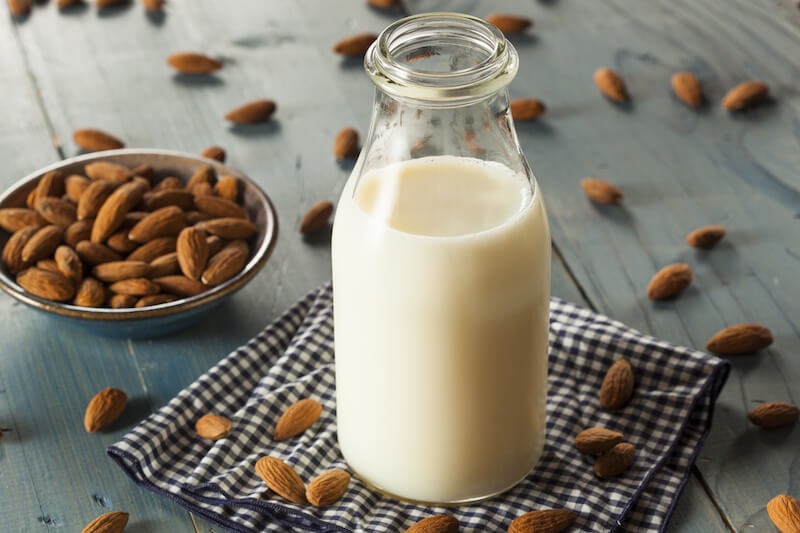Unlike other diets, Keto Zone allows mostly all of your dairy favorites: cheese, butter, yogurt, sour cream, eggs, and even heavy cream. But one dairy product, in particular, can easily knock you out of ketosis: milk. Full-fat versions are often mistaken for keto-friendly, but this household staple is more than meets the eye.
Why Isn’t Milk Keto Zone-Friendly?
Overall, whole milk specifically is very nutritious. One cup contains high amounts of vitamins and minerals like (1):
- Vitamin A
- Vitamin B12
- Vitamin D
- Phosphorus
- Magnesium
- Zinc
- Riboflavin
- Calcium
However, one cup of milk also contains 12 grams of carbohydrates that come from its natural sugar content, otherwise known as lactose. On the Keto Zone diet, that’s very close to the total daily limit of 20 grams. And for those who eat 3 meals a day, consuming more than half of your carb intake from a single serving of milk isn’t effective. (2)
On top of it not being low-carb safe, nearly 70% of people struggle with lactose intolerance, resulting in bloating, cramping, and other digestive issues. (3)
What About the Other Keto Zone Dairy Products?
If you’re confused by the fact that you can’t have milk but can have other dairy products, you aren’t alone! Let’s break it down.
High-fat dairy products like butter and cream have less lactose in them, meaning fewer carbohydrates. For example, one tablespoon of butter has 0 grams of carbohydrates, and it takes 4 more tablespoons to reach only 0.1 grams of carbohydrates. (4) Dairy with less lactose also means it’s easier to digest– perfect for those with lactose intolerances.
Although yogurt has a lesser fat content, it’s considered Keto Zone-friendly because of its healthy probiotics and lower carbohydrate number compared to milk. Just make sure to go always go for the full-fat, unsweetened versions!
It’s important to note that while lactose-free milk seems like it would be a good keto substitute, it contains the same number of carbs as regular milk. The “lactose-free” part means it’s regular milk that contains the enzyme lactase, which helps break down lactose.
Best Keto Zone Milk Substitutes:
If lactose-free milk isn’t a Keto Zone option, what are the alternatives?
Unsweetened Almond Milk
Unsweetened almond milk is the perfect low-calorie substitute with only 1.1 grams of carbohydrates per cup. (5) It’s made by blending almonds and water, then straining it to remove the excess. Unfortunately, this process removes a lot of the nutrients found in almonds, but thankfully, most brands are enriched with added vitamins and minerals.
These nutrients come with several health benefits:
- Strengthens Bones: Enriched almond milk can contain up to 45-50% of the recommended daily dose of calcium and enough vitamin D to help prevent osteoporosis and maintain bone solidarity. (6, 7)
- May Reduce the Risk of Heart Disease: Almond oil contains oleic acid, which has been shown to improve blood lipids, and its high vitamin E content can lower bad cholesterol. Both of these factors contribute to a reduced risk of heart disease. (8, 9, 10, 11)
- Fights Free Radicals: The vitamin E in almond milk is also a powerful antioxidant that can help protect your body from the harsh chemicals found in the environment. (12)
You can add almond milk into your diet by pouring it into your morning coffee, drinking it plain, or trying recipes like Keto Zone Iced Almond Mocha Shake.
Unsweetened Coconut Milk
Unsweetened coconut milk is another great low-carb milk substitute with only 0.6 grams of carbohydrates per cup. (13) There are two types of coconut milk: thick and thin. Although thick coconut milk is considered more nutritionally dense, they both have valuable benefits like:
- Aids Weight Loss: The MCT fats in coconuts suppress appetite and decrease caloric intake, thus aiding in weight loss. (14, 15, 16, ) In high amounts, these fats also produce the ketones necessary to burn fat and provide more energy. (17, 18) To get these in-bulk benefits, use Keto Zone MCT Oil Powder Coconut Cream Flavor.
- Improves Cholesterol: Studies show coconut lowers bad cholesterol, LDL, improves good cholesterol, HDL, and has positive impacts on triglyceride levels. (19, 20, 21, 22)
- Fights Bacteria: The lauric acid found in coconuts can fight bacteria and viruses that lead to infection. (23, 24, 25)
- Decreases Inflammation: Findings show coconut oil and extract have the ability to decrease inflammation, possibly helping inflammatory diseases like eczema and psoriasis. (26, 27, 28)
Coconut milk is one of the best low-carb substitutes to use instead of cow’s milk. Try this Keto Coconut Breakfast Chai recipe.
Bottom Line
Lack of carbs doesn’t mean you can’t enjoy milky beverages. Almond and coconut milk are both great alternatives, as well as Keto Zone Shakes.
Ready to purchase your needed Keto Zone Supplements? Shop here.

Leave a Reply